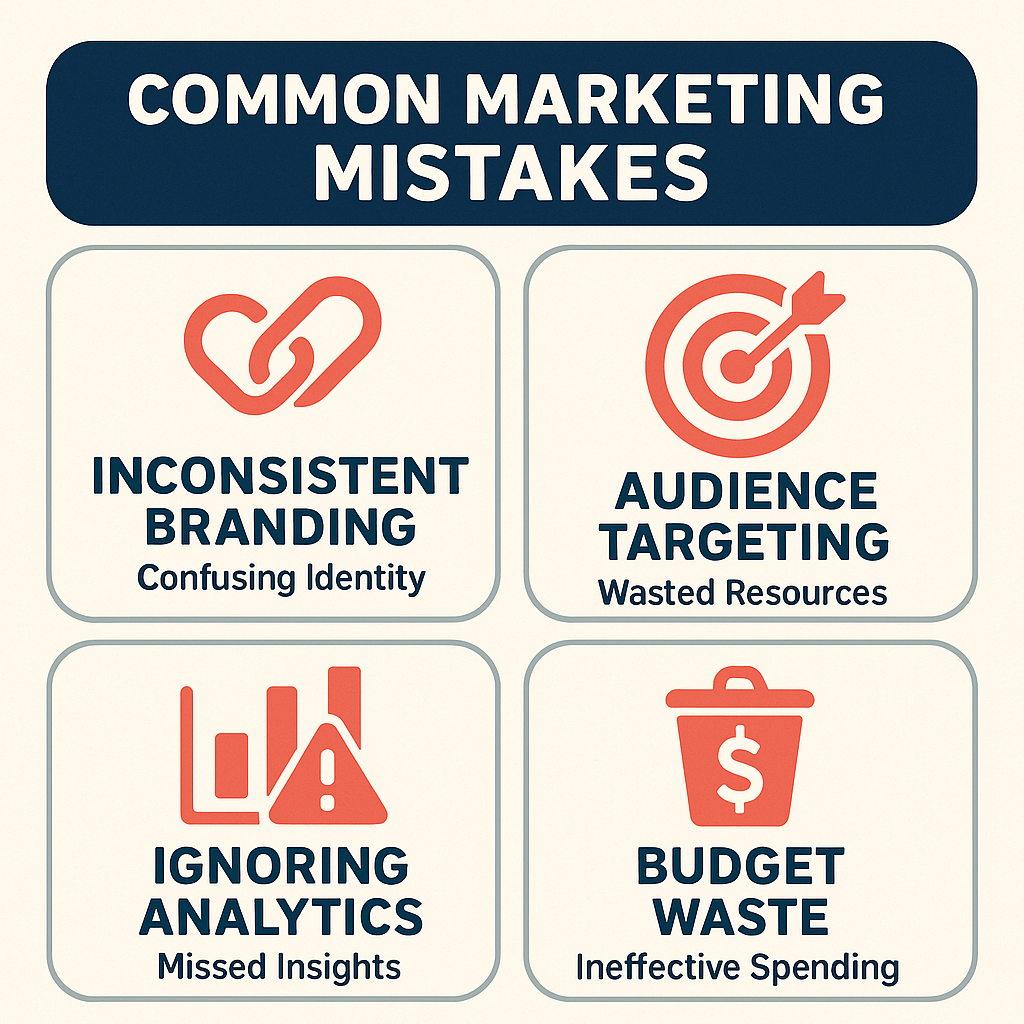Running a small business means wearing many hats, and marketing often becomes one of the most challenging roles to master. Unfortunately, the marketing mistakes small businesses should avoid are frequently the very ones that drain budgets and stunt growth. Research shows that over 23% of small businesses fail partly due to poor marketing execution, making it crucial to identify and correct these common pitfalls before they become costly problems.
The digital landscape has created new opportunities for small businesses to reach their target audiences, but it's also introduced fresh ways to waste resources. From inconsistent branding to ignoring valuable analytics data, these mistakes might seem minor at first glance but can significantly impact your bottom line and long-term success.
Brand Identity Blunders That Confuse Customers

Brand identity blunders that confuse customers represent one of the most damaging marketing mistakes small businesses make. Inconsistent branding across different platforms and touchpoints can leave potential customers scratching their heads about who you are and what you offer.
- Mixed messaging across platforms: Using different logos, color schemes, or brand voices on your website versus social media creates confusion and weakens brand recognition.
- Unclear value propositions: Failing to clearly communicate what makes your business unique or why customers should choose you over competitors leaves people uncertain about your offerings.
- Inconsistent visual elements: Switching between different fonts, imagery styles, or design approaches makes your business appear unprofessional and unreliable.
- Lack of brand guidelines: Without established standards for how your brand should look and sound, every piece of marketing content becomes a gamble that might dilute your identity.
Audience Targeting Failures That Waste Resources
Audience targeting failures that waste resources often stem from the assumption that everyone could be a potential customer. This shotgun approach to marketing typically results in budget waste and poor conversion rates, as your message fails to resonate with anyone in particular.
- Casting too wide a net: Trying to appeal to everyone usually means appealing to no one, as your messaging becomes too generic to connect with specific customer needs.
- Ignoring customer demographics: Failing to research and understand your ideal customer's age, location, income level, and interests leads to misdirected marketing efforts.
- Wrong platform selection: Choosing social media platforms or advertising channels without considering where your target audience actually spends their time wastes both money and effort.
- Generic content creation: Producing one-size-fits-all content instead of tailored messages that speak directly to your audience's pain points and desires reduces engagement significantly.
Analytics Oversights That Hide Growth Opportunities
Analytics oversights that hide growth opportunities represent a critical blind spot for many small businesses. Ignoring analytics means missing valuable insights about what's working, what's not, and where you should focus your marketing efforts for maximum impact.
- Not tracking key metrics: Failing to monitor website traffic, conversion rates, customer acquisition costs, and return on investment leaves you guessing about campaign effectiveness.
- Ignoring customer behavior data: Missing patterns in how customers interact with your website, social media, or email campaigns means you can't optimize for better results.
- Skipping competitor analysis: Not keeping tabs on what your competitors are doing successfully might cause you to miss trending strategies or emerging opportunities in your market.
- Making decisions without data: Relying on gut feelings instead of concrete performance metrics often leads to continued investment in ineffective marketing strategies.
Digital Presence Problems That Limit Reach
Digital presence problems that limit reach have become increasingly costly mistakes as more consumers turn to online research before making purchasing decisions. In today's digital landscape, having weak or inconsistent online presence can severely handicap your ability to connect with potential customers.
- Outdated or missing website: Not having a professional, mobile-friendly website or letting your existing site become outdated signals to customers that your business might not be reliable or current.
- Neglected social media accounts: Creating social media profiles but rarely posting content or engaging with followers can actually hurt your reputation more than having no presence at all.
- Poor search engine visibility: Failing to optimize your website and content for search engines means potential customers might never discover your business when looking for your products or services.
- Inconsistent posting schedules: Sporadic content creation and irregular posting patterns make it difficult to build an engaged audience and maintain top-of-mind awareness with potential customers.
Steps to Transform Your Marketing Strategy
Steps to transform your marketing strategy require a systematic approach that addresses the marketing mistakes small businesses should avoid while building sustainable small business growth practices. Taking action on these steps can help prevent the budget waste and missed opportunities that plague many small business marketing efforts.
- Audit your current marketing efforts: Review all existing marketing materials, campaigns, and channels to identify inconsistencies in branding and messaging that might be confusing potential customers.
- Define your target audience clearly: Create detailed customer personas based on actual data about your best customers, including their demographics, preferences, and buying behaviors to improve targeting accuracy.
- Implement tracking and analytics systems: Set up proper measurement tools to monitor key performance indicators and gather data that will inform future marketing decisions and strategy adjustments.
- Establish brand guidelines and consistency: Create clear standards for your visual identity, messaging, and brand voice that can be applied consistently across all marketing channels and customer touchpoints.
- Develop a content calendar and strategy: Plan your marketing activities in advance with a focus on providing value to your target audience while maintaining regular engagement across your chosen platforms.
The marketing mistakes small businesses should avoid might seem overwhelming at first, but recognizing these pitfalls is the first step toward building a more effective marketing strategy. Remember that over 23% of small business failures can be attributed partly to poor marketing execution, making it essential to address issues like inconsistent branding, no audience targeting, ignoring analytics, and budget waste before they impact your bottom line.
Success in small business marketing doesn't require perfection from day one. It requires commitment to continuous improvement, willingness to track what's working, and the flexibility to adjust your approach based on real data rather than assumptions. By focusing on consistent branding, targeted messaging, data-driven decisions, and maintaining a strong digital presence, you'll be well-positioned to avoid the common mistakes that derail many small business marketing efforts.

.png)






